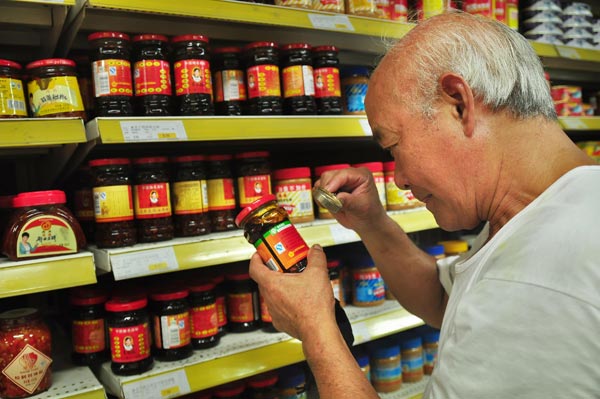
Economy continues to face significant downward pressure
China saw a rebound in inflation for the first time in five months as well as the slowest growth pace for industrial output in three years in August, increasing the risk its economic slowdown may now extend into a seventh quarter.
 |
|
A man scrutinizes the production date of canned food at a supermarket in Ningbo of Zhejiang province on Sunday.HU XUEJUN / FOR CHINA DAILY |
The country's Consumer Price Index (CPI), a key gauge of inflation, rose 2 percent from a year earlier, up from July's 1.8 percent, driven mainly by rising food prices, according to data released by the National Bureau of Statistics (NBS) on Sunday.
Meanwhile, the growth in industrial output cooled to the slowest pace in 39 months to 8.9 percent, the third decline from May's 9.6 percent, June's 9.5 percent and July's 9.2 percent.
Analysts suggested the rebound in inflation may reduce the government's options in how best to stabilize and stimulate economic growth in the world's second-largest economy, which President Hu Jintao said on Saturday faces "notable downward pressure".
Europe's debt crisis has crimped exports and a crackdown on property selling is damping domestic demand, while rising housing and food costs threaten to trigger another round of consumer-price increases.
"It may not be a temporal rebound of the CPI, but it is a turning point for the year, which means that inflation in the fourth quarter will keep rising to about 2.8 percent," said Li Xunlei, the vice-president and chief economist with the Haitong Securities Co Ltd.
In August, vegetables surged 23.8 percent in price, compared with 8 percent in July, which alone lifted the CPI by 0.6 percentage points, while fruit prices surged 9.7 percent.
Food prices increased by 3.4 percent year on year, up from 2.4 percent in July, while non-food prices increased by 1.4 percent, down from 1.5 percent in July.
Qu Hongbin, the chief economist in China with HSBC Holdings Plc said the rebound in the CPI was influenced by a shortage of vegetable supplies, not because of any easing in monetary policy.
NBS said the indicator showed that consumer inflation in August jumped again after monthly consecutive declines since March.
During the first eight months, the consumer inflation growth rate was 2.9 percent.
It seems that to achieve the government's stated inflation rate target of "no higher than 4 percent" may be not difficult.
Meanwhile, the Producer Price Index showed a worsening situation for industrial sectors with a fall of 3.5 percent in August from a year earlier, the sixth consecutive decline and reaching a new 34-month low.
Analysts said the result suggested corporate profits may continue to slip and accelerate the ongoing deterioration of the manufacturing sector.
Wang Ming, a sales representative with Zhongshan Beiaos Metal Products Co Ltd, a maker of car alarms and locking systems based in Zhongshan of South China's Guangdong province, said his company is slashing output.
"We don't want to, but we have to. The demand hasn't been there. We are having a hard time selling our products."
Refusing to give exact figures on the company's sales so far this year, he still described its current business levels as "really bad".
"Instead of a rebound, industrial companies may face an even more difficult situation, which may drag the economy down further," said Li Changan, an economic professor in the University of International Business and Economics.
The NBS figures showed investment in fixed assets, a traditional strength of the world's second biggest economy, also saw a slight slowdown in the first eight months, with an increase of 25.1 percent during the period from January to August, compared with 25.5 percent in the first seven months.
Slower growth
Experts said the latest gloomy indicators add further evidence that previous policy easing and stimulus measures had so far failed to stop the economic slowdown.
China's economy expanded 7.6 percent in the three months through June from a year earlier, the least in three years and the sixth straight quarterly slowdown.
Li added that he would be in favor of the government taking more aggressive measures to ease its monetary policy and stimulate growth.
He also forecast that the central bank may cut both benchmark interest rates and the reserve requirement ratio in the next two months.
The central bank has held back from any significant monetary policy loosening since July 5, when it cut interest rates for the second time in less than a month. It also lowered lenders' reserve requirements three times between November and May.
Speaking to business leaders at an Asia-Pacific Economic Cooperation forum in Vladivostok over the weekend, President Hu Jintao reiterated that China will work to balance "steady and robust growth, adjusting economic structure and managing inflation expectations".
He pledged to boost domestic demand and ensure "basic price stability".
He also urged governments in the region to speed up infrastructure development, describing it as key to promoting recovery and achieving sustained and stable growth.
His comments follow a slew of recent announcements by the Chinese government approving the construction of new roads, railways and urban infrastructure that Nomura Holdings Inc estimates will have a combined value of about 1 trillion yuan ($158 billion).
Wang Tao, China economist at UBS AG, said she expected a modest sequential recovery starting from the fourth quarter, driven by policy support and the stabilization of property construction.
 Washington to remain focused on Asia-Pacific
Washington to remain focused on Asia-Pacific RQFII target blue chips amid bear market
RQFII target blue chips amid bear market Australian recall for top two exporters
Australian recall for top two exporters China fears new car restrictions
China fears new car restrictions